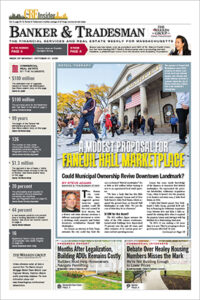
Greg Maynard
In September, Boston released the “Article 80 Modernization Draft Action Plan” laying out the City’s goals for reforming the process and rules by which all of Boston’s major real estate development projects, and most of its smaller ones, are approved. This plan is part of Mayor Michelle Wu’s campaign promise to reform planning and development in Boston.
Unlike previous mayoral administrations whose policy promises were just a line or two in a speech or press release, the Wu administration’s new report can be directly compared to the 76-page white paper, “Abolish the BPDA,” written by then-City Councilor Michelle Wu that details an ambitious set of reforms for Boston’s planning and development processes and bureaucracy.
Boston Policy Institute’s analysis of these two documents finds that Mayor Wu is not implementing Councilor Wu’s Article 80 reforms.
Article 80 reform is one of the most crucial steps in overhauling planning and development. In fact, at a Boston City Council hearing earlier this year, Marc Draisen, the executive director of the Metropolitan Area Planning Commission and one of Massachusetts’ top planners, said that Article 80 reform was “more important” than creating a new Planning Department, another one of Wu’s initiatives. Unfortunately, BPI’s analysis finds that Mayor Wu falls short of Councilor Wu’s goals on Article 80 in three key ways.
Small-Bore Proposals, Little Progress
First, 2024’s Draft Action Plan rehashes ideas first proposed in 2019 in extremely similar language and with no evidence that City Hall has taken action on these ideas in the intervening time.
For example, the Draft Action Plan proposes to “tie community benefits to planning efforts” by “pool[ing] resources from multiple projects,” in language that is strikingly similar to the “district mitigation funds” proposed by Councilor Wu in 2019. With few changes to the proposal, work on mitigation should have begun already, but the next step in the Draft Action Plan is to collaborate with another city agency to “identify and collect existing plans and policies.”
Restated 2019 proposals and next steps like this can be found throughout the Draft Action Plan, raising questions about why the city’s planners haven’t advanced beyond Councilor Wu’s now-five-year-old report.
Second, the Draft Action Plan retreats from several of 2019’s bold ideas, and shows Mayor Wu settling for the sort of tinkering that Councilor Wu was explicitly against.
In 2019, Councilor Wu criticized district-by-district zoning reforms and subsequent neighborhood-level rezonings as much too narrow and called for a “proper rezoning.” She instead proposed starting with comprehensive master planning to inform citywide zoning code updates.
However, Mayor Wu’s and her Planning Department have not made any substantive moves to do a citywide zoning code update or create a master plan, instead, they are proposing small-bore fixes in this Draft Action Plan.
This retreat, combined with the recently released and deeply unambitious Roslindale Village Squares + Squares draft plan, make clear that Boston is not pursuing 2019’s “proper rezoning,” an explicit rejection by Mayor Wu of Councilor Wu’s call for Boston to engage in the hard work of systemic change.
Legal, Political Uncertainty Remains
Third, in 2019 Councilor Wu acknowledged that there were big technical questions – about transparency, cost and legality – that a City Council office could not answer. In 2024, those questions seem well within the ability of the mayor of Boston’s office to deal with, but the Draft Action Plan chooses to sidestep those questions.
For example, the Draft Action Plan’s section on “standardized mitigation” acknowledges major legal questions still remain, writing that the Planning Department needs to “conduct due diligence to assess the legal requirements of new formulas, including nexus studies and any necessary enabling legislation.”
Legislation means home rule petitions, and Boston has a poor record of getting those passed. This is especially true for the sort that “standardized mitigation” would likely require, with state-wide policy implications that give the city power to collect new revenue. Despite all the attorneys in City Hall and private practice whose business is to understand the legal framework of Boston’s planning process, there still aren’t any straight answers.
Where does this leave Article 80 modernization at the start of 2025? There is not a clear answer. The mayor’s State of the City speech has traditionally been where big announcements like next steps for a major reform are made, but that speech’s usual January date has been pushed to March.
The City Council’s support for a far-reaching change like this is also important, but the Council has not yet held a hearing on the Draft Action Plan. The last time the Council had a hearing about Article 80 modernization was in July – before the Draft Action Plan was published – and the hearing order was filed in January. If the Council follows that timeline in 2025, another Article 80 hearing won’t happen until the summer.
Unlike 2024 however, this coming summer will be in the midst of Boston’s city elections, which is not typically a time that the city’s politicians or public have much appetite for major action.
Greg Maynard is founder of the Boston Policy Institute, a non-partisan, nonprofit that provides analysis about issues facing Massachusetts and the city of Boston
Editor’s Note: An earlier version of this op-ed misspelled the name of Marc Draisen, executive director of the Metropolitan Area Planning Council.






